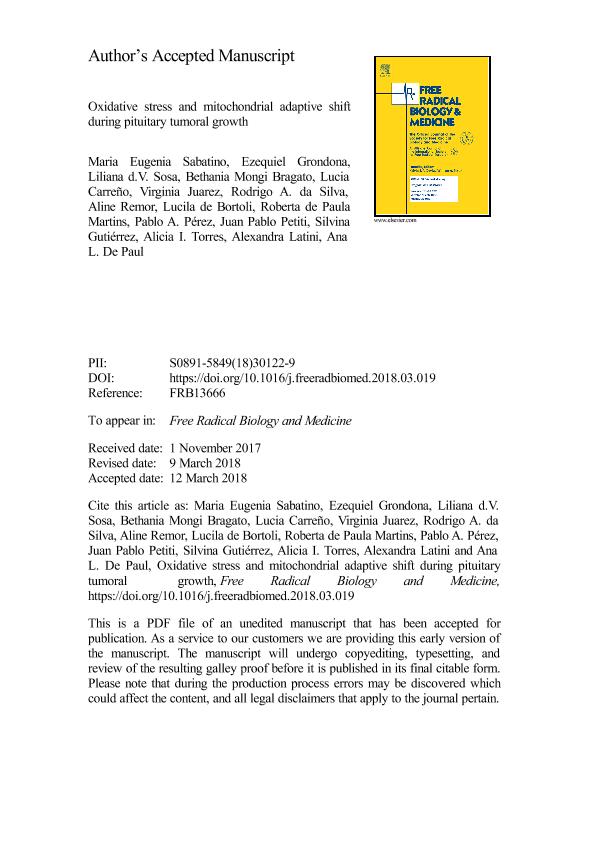Artículo
Oxidative stress and mitochondrial adaptive shift during pituitary tumoral growth
Sabatino, María Eugenia ; Grondona, Ezequiel
; Grondona, Ezequiel ; Sosa, Liliana del Valle
; Sosa, Liliana del Valle ; Mongi Bragato, Bethania del Carmen
; Mongi Bragato, Bethania del Carmen ; Carreño, Lucía
; Carreño, Lucía ; Juarez, Andrea Virginia
; Juarez, Andrea Virginia ; da Silva, Rodrigo A.; Remor, Aline; de Bortoli, Lucila; Paula Martins, Roberta de; Pérez, Pablo Aníbal
; da Silva, Rodrigo A.; Remor, Aline; de Bortoli, Lucila; Paula Martins, Roberta de; Pérez, Pablo Aníbal ; Petiti, Juan Pablo
; Petiti, Juan Pablo ; Gutiérrez, Silvina
; Gutiérrez, Silvina ; Torres, Alicia Ines
; Torres, Alicia Ines ; Latini, Alexandra; de Paul, Ana Lucia
; Latini, Alexandra; de Paul, Ana Lucia
 ; Grondona, Ezequiel
; Grondona, Ezequiel ; Sosa, Liliana del Valle
; Sosa, Liliana del Valle ; Mongi Bragato, Bethania del Carmen
; Mongi Bragato, Bethania del Carmen ; Carreño, Lucía
; Carreño, Lucía ; Juarez, Andrea Virginia
; Juarez, Andrea Virginia ; da Silva, Rodrigo A.; Remor, Aline; de Bortoli, Lucila; Paula Martins, Roberta de; Pérez, Pablo Aníbal
; da Silva, Rodrigo A.; Remor, Aline; de Bortoli, Lucila; Paula Martins, Roberta de; Pérez, Pablo Aníbal ; Petiti, Juan Pablo
; Petiti, Juan Pablo ; Gutiérrez, Silvina
; Gutiérrez, Silvina ; Torres, Alicia Ines
; Torres, Alicia Ines ; Latini, Alexandra; de Paul, Ana Lucia
; Latini, Alexandra; de Paul, Ana Lucia
Fecha de publicación:
05/2018
Editorial:
Elsevier Science Inc
Revista:
Free Radical Biology and Medicine
ISSN:
0891-5849
Idioma:
Inglés
Tipo de recurso:
Artículo publicado
Clasificación temática:
Resumen
The cellular transformation of normal functional cells to neoplastic ones implies alterations in the cellular metabolism and mitochondrial function in order to provide the bioenergetics and growth requirements for tumour growth progression. Currently, the mitochondrial physiology and dynamic shift during pituitary tumour development are not well understood. Pituitary tumours present endocrine neoplastic benign growth which, in previous reports, we had shown that in addition to increased proliferation, these tumours were also characterized by cellular senescence signs with no indication of apoptosis. Here, we show clear evidence of oxidative stress in pituitary cells, accompanied by bigger and round mitochondria during tumour development, associated with augmented biogenesis and an increased fusion process. An activation of the Nrf2 stress response pathway together with the attenuation of the oxidative damage signs occurring during tumour development were also observed which will probably provide survival advantages to the pituitary cells. These neoplasms also presented a progressive increase in lactate production, suggesting a metabolic shift towards glycolysis metabolism. These findings might imply an oxidative stress state that could impact on the pathogenesis of pituitary tumours. These data may also reflect that pituitary cells can modulate their metabolism to adapt to different energy requirements and signalling events in a pathophysiological situation to obtain protection from damage and enhance their survival chances. Thus, we suggest that mitochondria function, oxidative stress or damage might play a critical role in pituitary tumour progression.
Palabras clave:
GLYCOLYSIS
,
MITOCHONDRIA
,
NRF2 PATHWAY
,
OXIDATIVE STRESS
,
PITUITARY TUMOUR
Archivos asociados
Licencia
Identificadores
Colecciones
Articulos(CIBICI)
Articulos de CENTRO DE INV.EN BIOQUI.CLINICA E INMUNOLOGIA
Articulos de CENTRO DE INV.EN BIOQUI.CLINICA E INMUNOLOGIA
Articulos(INICSA)
Articulos de INSTITUTO DE INVESTIGACIONES EN CIENCIAS DE LA SALUD
Articulos de INSTITUTO DE INVESTIGACIONES EN CIENCIAS DE LA SALUD
Citación
Sabatino, María Eugenia; Grondona, Ezequiel; Sosa, Liliana del Valle; Mongi Bragato, Bethania del Carmen; Carreño, Lucía; et al.; Oxidative stress and mitochondrial adaptive shift during pituitary tumoral growth; Elsevier Science Inc; Free Radical Biology and Medicine; 120; 5-2018; 41-55
Compartir
Altmétricas



